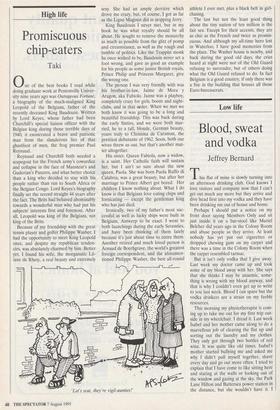High life
Promiscuous chip-eaters
Taki
0 ne of the best books I read while doing graduate work at Pentonville Univer- sity nine years ago was Outrageous Fortune, a biography of the much-maligned King Leopold of the Belgians, father of the recently deceased King Baudouin. Written by Lord Keyes, whose father had been Churchill's special liaison officer with the Belgian king during those terrible days of 1940, it exonerated a brave and patriotic man from the slanderous lies of that ghastliest of men, the frog premier Paul Reynaud.
Reynaud and Churchill both needed a scapegoat for the French army's cowardice and collapse in the face of Manstein's and Guderian's Panzers, and what better choice than a king who decided to stay with his people rather than run to South Africa or the Belgian Congo. Lord Keyes's biography finally set the record straight 44 years after the fact. The Brits had behaved abominably towards a wonderful man who had put his subjects' interests first and foremost. After all, Leopold was king of the Belgians, not king of the Brits.
Because of my friendship with the great tennis player and golfer Philippe Washer, I had the opportunity to meet King Leopold once, and despite my republican tenden- cies, was absolutely charmed by him. Better yet, I found his wife, the morganatic Lil- iane de Rhety, a real beauty and extremely sexy. She had an ample derriere which drove me crazy, but, of course, I got as far as the Ligne Maginot did in stopping Jerry.
King Baudouin I never met, but in my book he was what royalty should be all about. He sought to remove the monarchy as much as possible from the glitz of pomp and circumstance, as well as the rough and tumble of politics. Like the Trappist monk he once wished to be, Baudouin never set a foot wrong, and gave as good an example for his people as some junior British royals, Prince Philip and Princess Margaret, give the wrong one.
The person I was very friendly with was his brother-in-law, Jaime de Mora y Aragon, aka Fabiolo. Jaime was a playboy, completely crazy for girls, booze and night- clubs, and in that order. When we met we both knew it was going to be a long and beautiful friendship. This was back during the early Sixties, and we were both mar- ried, he to a tall, blonde, German beauty, yours truly to Christina de Caraman, the prettiest debutante of 1962. Soon, both our wives threw us out, but that's another mat- ter altogether.
His sister, Queen Fabiola, now a widow, is a saint. Her Catholic faith will sustain her, but I ain't so sure about the new queen, Paola. She was born Paola Ruffo di Calabria, was a great beauty, but after her marriage to Prince Albert got bored. Her children I know nothing about. What I do know is that Belgians love eating chips and fornicating — except the gentleman king who has just died.
Ironically, two of my father's most suc- cessful as well as lucky ships were built in Belgium, Antwerp to be exact. I went to both launchings during the early Seventies, and have been thinking of them lately because it's just about time to retire them. Another retired and much loved person is Arnaud de Borchgrave, the world's greatest foreign correspondent, and the aforemen- tioned Philippe Washer, the best all-round `Let's scat, they're vigil-aunties!' athlete I ever met, plus a black belt in girl- chasing.
The last but not the least good thing about the tiny nation of ten million is the fair sex. Except for their accents, they are as chic as the French and twice as promis- cuous. And although my all-time hero lost in Waterloo, I have good memories from the place. The Washer house is nearby, and back during the good old days, the cries heard at night were not of the Old Guard refusing to surrender, but of others doing what the Old Guard refused to do. In fact Belgium is a good country, if only there was a fire in the building that houses all those Euro-bureaucrats.


















































 Previous page
Previous page